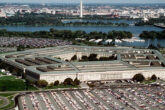November 08, 2019
The Enduring Relevance of Reagan’s Westminster Speech
Editor’s Note: This is the third in a series of three essays, commissioned by the Ronald Reagan Presidential Foundation and Institute, examining the legacy of Reagan’s Westminster Speech and its relevance for democracy promotion today. Read the first installment by Carl Gershman here. The second, by Daniel Twining, is here.
In retrospect, it all seems so clear. In June 1982, the world had reached “a turning point,” Ronald Reagan said, “a great revolutionary crisis” within the Soviet Union.1 Moscow was overstretched, pouring resources into armaments while central planning stalled economic growth. Despite the USSR’s routine use of force to quell any stirrings of discontent, the yearning for liberty was rising from Central Europe to Vladivostok. “The march of freedom and democracy,” Reagan said, “will leave Marxism-Leninism on the ash-heap of history as it has left other tyrannies which stifle the freedom and muzzle the self-expression of the people.”
The populations trapped behind the Iron Curtain were, the President announced, moving toward democracy. But their progress would not occur in isolation – they required the active support of the free world. “How we conduct ourselves here in the Western democracies,” Reagan said at Westminster, “will determine whether this trend continues.” And so, the United States would be no idle observer, silently cheering on the unfolding of freedom in lands where it was then denied. Democracy may be no fragile flower, the President observed, but “still it needs cultivating. If the rest of this century is to witness the gradual growth of freedom and democratic ideals, we must take actions to assist the campaign for democracy.”
With his Westminster address, President Reagan set the course for an active and institutionalized American program of worldwide democracy support. Proposing “to foster the infrastructure of democracy, the system of a free press, unions, political parties, universities,” Reagan set out the framework for what soon became the National Endowment for Democracy, the International Republican Institute, the National Democratic Institute and their sister organizations.
Read the full article in The American Interest.
- Ronald Reagan, Address to the British Parliament at Westminster, 1982. ↩
More from CNAS
-
The Department of Defense’s Breakthrough Nuclear Moment Risks Slipping Away
Unless they act, the Department of Defense’s breakthrough nuclear moment may vanish before it really happens....
By Will Rogers
-
DEFAERO Strategy Series [Apr 09, 25] CNAS' Becca Wasser and Phil Sheers on Revitalizing the U.S. Defense Industrial Base
On this episode of the Defense & Aerospace Report Strategy Series, sponsored by General Atomics Aeronautical Systems, Becca Wasser and Phil Sheers of the Center for a New Amer...
By Becca Wasser & Philip Sheers
-
From Production Lines to Front Lines
Executive Summary The U.S. defense industrial base (DIB) is struggling to meet the demands of the current strategic environment—let alone prepare for a potential conflict agai...
By Becca Wasser & Philip Sheers
-
The Pentagon’s Endangered Brain Trust
In this environment, sound assessments of emerging threats and new ideas to counter them will be especially vital....
By Dr. Andrew Krepinevich, Jr.




